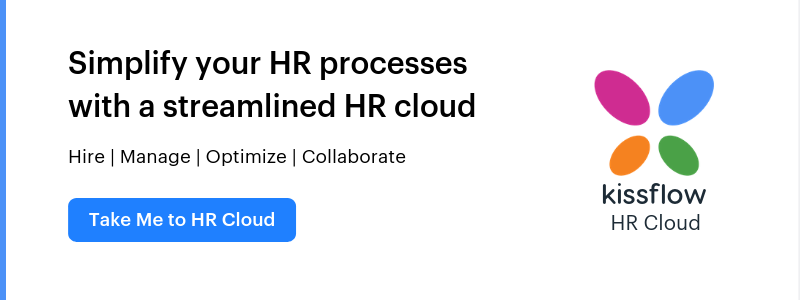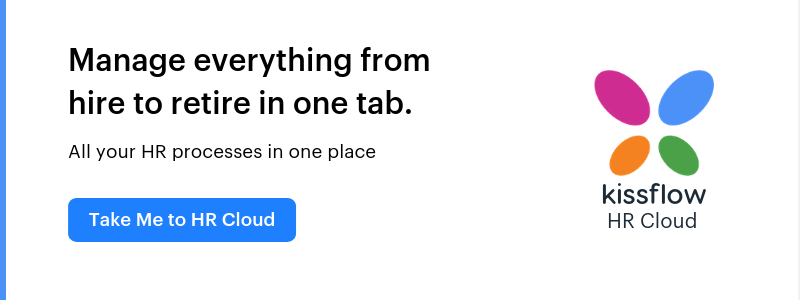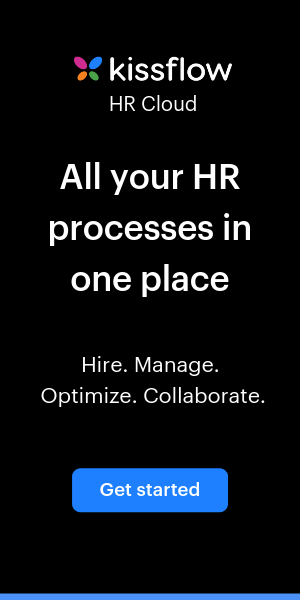Human resource (HR) process automation has been around for a while, but things have progressed farther than ever before over the past few years. Cloud-based apps and human resource planning solutions have helped HR professionals overcome many of the hindrances that they had to deal with in the past.
Cloud-based solutions will dominate 2019 and the years to come. Here is some interesting information on adopting HRM process automation and on how cloud HR softwares can help your company’s workforce management become more effective.
It is time to move to a Cloud HR software
Most professionals who want to switch to a cloud-based solution report that the desire is driven by the HR department’s need for better functionality and more scalability. Often, on-premise software for strategic human resource planning doesn’t come with such capabilities.
Listed below are five tell-tale signs that your HR processes can be replaced easily by a Cloud HR software:
- Your HR processes are standardized
- There are already paper-based HR templates in place
- The standard flow of approvals has been determined
- Each task in your HR process has an accountable owner
- You have a list of HR policies and regulations to abide by
The report concludes that in five or more years, the vast majority of HR departments in the US will depend heavily on cloud-based solutions as far as automating the HRM process goes.
7 features every cloud HR solution needs to offer
There is an array of cloud HR softwares in the market. But all great HR solutions will offer the following features at a minimum.
Here are some of the most important features cloud HR software must have:
- Digital forms that capture, approve and keep track of requests (PTO, onboarding, etc.)
- Rule-based, conditional workflows that ensure policy and regulatory compliance
- Employee self-service interface to onboard and manage confidential employee data
- Multi-channel accessibility to view, manage, and approve/reject requests on the go
- Inbuilt reporting module to generate actionable, data-driven insights
- Seamless API integration to connect the HR cloud with software like payroll systems
Top 5 cloud-based HR tools every business needs to evaluate
Selecting the right HR software is much more than a good business decision. Often, it is the difference between a stress-free HR team and a set of hassled HR professionals who scramble to deal with disengaged employees, frustrated managers, coworkers, and finance team members.
While there is a myriad of cloud-based HR management tools out there, here’s a list of the top 5 cloud HR softwares that stand out in the market:
1. Kissflow HR Cloud
Kissflow HR Cloud is a comprehensive HR solution that automates every step of the hire to retire cycle. It comprises of an array of dedicated HR modules like applicant tracking, onboarding, performance management, leave management, timesheet management, and offboarding.
Unlike other cloud HR software, Kissflow HR Cloud offers the flexibility to customize HR processes to fit unique business needs. It combines agile core HR functionality with actionable insights and a seamless multi-channel interface. Best of all, organization can offer their employees a tailor-made employee experience with its built in employee collaboration module while toning down operating costs and improving retention.
Pros: Flexible interface, rule-based workflows, insightful reports, 360-degree feedback, seamless API integration, collaboration platform, and custom branding
Cons: Lack of benefits, payroll, and compensation management modules
2. Workday HCM
Workday HCM is a leading cloud-based HR solution provider in the market. Its user-friendly interface makes it a great tool for handling all HR-related processes. It is widely used to store employee information, facilitate onboarding, manage employee benefits, create and implement talent plans, and retrieve actionable business insights.
Pros: Multi-factor authentication, no version control issues, easy-to-use mobile app, builtin payroll system, unified information repository, and robust performance management functions
Cons: Lack of notification emails, limited ability to customize, and lack of user guides to bring people up to speed
3. Ultipro HCM
Ultipro HCM is the first HR provider to embrace the concept of HR in the cloud. Initially it was just a basic HRMS/payroll system, however, over the years, it grew to an end-to-end HR and talent management system which is a far cry from its initial version.
It caters to HR functionalities such as recruitment, onboarding, payroll, employee and manager self-service, benefits administration, succession management, talent retention, time and attendance, workforce scheduling, and analytics.
Pros: Payroll processing, recruiting gateway, robust onboarding process, customer portal, business intelligence module, and annual networking conferences
Cons: Lack of customization, long learning curve, and cluttered interface.
4. Kronos Workforce Ready
Kronos Workforce Ready is the ideal option for HR and business functions that involve a large number of employees. It helps businesses to process payroll, manage and approve/reject timesheets, streamline PTO requests, and manage all employee data in a single interface.
Being the first self-service hub in the market, their system of record is one of the best functionality. While it may closely resemble an integrated talent management solution than a core HR software, it is a powerful application with modules that cater to talent acquisition, payroll, timekeeping, absence management, scheduling, analytics, and mobile app.
Pros: Benefits management, reporting capability, payroll interface, scheduler, and best user-facing portal in the market
Cons: Complicated admin settings, insufficient training materials, and feature overload
5. Sage HRMS
Sage HRMS is built exclusively for small to medium-sized organizations that aspire to optimize the end-to-end employee lifecycle. It includes modules for core HR, payroll, basic talent management, workforce management, and L&D capabilities.
Its analytics and reporting modules make performance management efficient and effortless. Additionally, it can be configured to assist in day-to-day payroll processing functionalities including taxation, benefits, compliance (OHSA), and reporting.
Pros: Excellent payroll and benefits tracking, recruitment management, self-service onboarding, and ability for the end user to make mass updates
Cons: Fluctuating attendance, database infrastructure, custom reporting limitations, and steep learning curve
Benefits of using cloud-based HR tools
If we can conclude anything from the survey data above, 2019 and the immediate years after that will be marked by cloud-based human resource planning automation.
More and more companies are recognizing the benefits that automated HR processes bring to the table. Human resource planning can be quite complex, and automation reduces the risk of human error while also enabling professionals to focus on the most challenging aspects of their job. Automation that is cloud-based takes the trend a step further and reveals new possibilities.
Web-based human resource planning apps brings various important advantages. Some of the most crucial benefits that they bring to the everyday HRM process are:
- Easy access to human resource planning tools from any location via internet – the trend benefits companies that want to offer their professionals a bit of flexibility.
- Effortless scalability: the HRM processes on cloud are can evolve together with the company’s growth (new apps can be added easily, storage capacity can be increased or decreased, new forms and workflow automation processes can be set up in the blink of an eye, etc.).
- Elimination of paper clutter and waste – two very troublesome aspects of traditional human resource planning.
- Improved employee retention and a higher level of productivity guaranteed by better human resource planning and 24/7 access to valuable data.
- Higher level of information security, especially for sensitive corporate data.
- Efficient integration with other solutions and software programs that the company relies on (e.g., integrating with a payroll software).
- No expensive maintenance or need for upgrades, there are no add-on installation costs or the need for buying expensive hardware for support.
- Compliance with archive creation and maintenance regulations.
- Easy user experience, even for people who haven’t dealt with human resource planning software in the past.
Latest trends in HR management
HR process automation via the use of cloud technologies is enjoying a lot of popularity today. Currently, the adoption of cloud HR software is growing faster than ever before.
Just like the Gartner market report forecasted, cloud-based HR software represented 50 percent or more of all human resource planning tools in 2017. There’s a reason for this quick rate of adoption. Companies that have upgraded their HRM processes see a reduction in processing costs that reaches 22 percent per employee.
The trend is likely to continue in 2019 as well. According to an ISG report, 48 percent of HR professionals report that they want to modernize their HRM process in 2018 by replacing the current software with a cloud-based human resource planning and automation tool. Respondents in the survey also said that they wanted to replace their existing software altogether. Only 12 percent are interested in upgrading the current solution that they rely on rather than switching to a new one.
Summary
With so many benefits that cloud HR software offer, it doesn’t cost a bomb for your company to update your human resource planning process. It is the future because it is easy, cost-efficient, it allows access via multiple devices, and effortless integration with other solutions.
If you haven’t made the switch yet, you’re losing money and your HR processes are far from optimal. The time is ripe to transition. Cloud-based HR Tools like Kissflow HR Cloud are highly scalable and pocket friendly. It is well suited for organizations of all sizes that need a robust set of HR management features. Its extensive reporting functionality will serve the needs of most enterprise-level HR teams.
If you’re on the look out for a cloud-based HR solution, take Kissflow HR Cloud for a spin and see easy it is to simplify your HR processes.
Related Articles:
- How to Choosing the Best HR Software
- HR Management Software for Your Small Business
- Best Recruitment Tools
- Best HR Tools
- Employee Onboarding Software
- Applicant Tracking Tool


